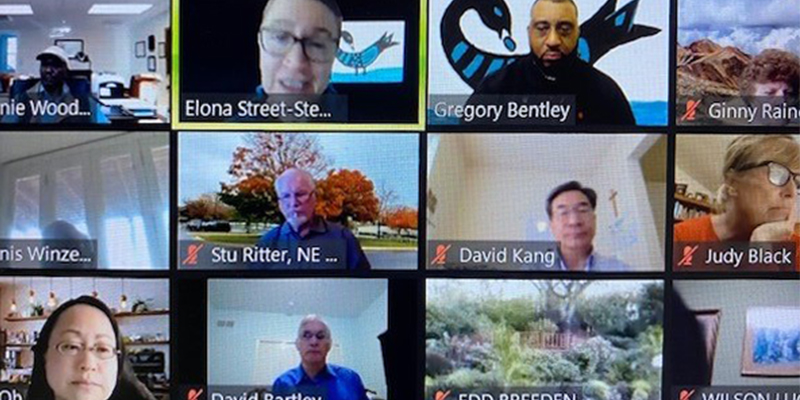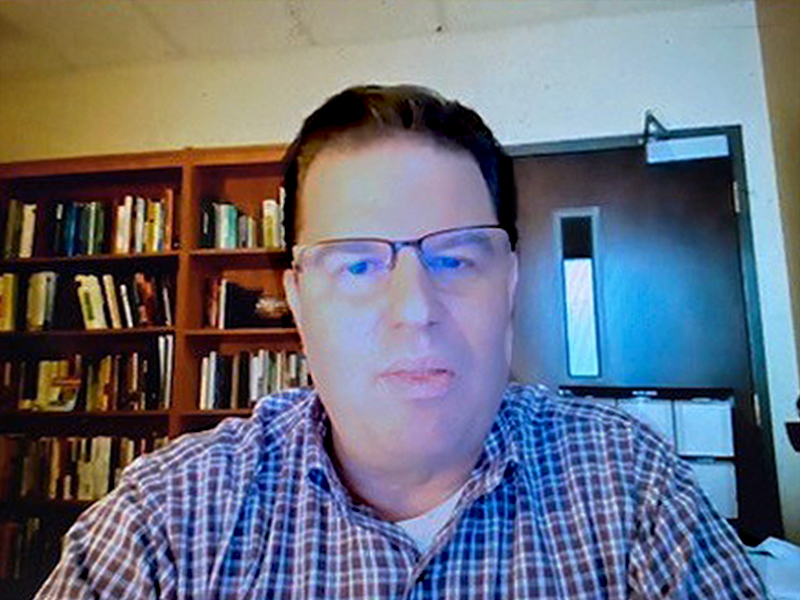
The Co-Moderators of the 224th General Assembly (2020), Ruling Elder Elona Street-Stewart and the Reverend Gregory Bentley, took part in a panel discussion during the Mid Council Leaders Gathering.
Complaints from parishioners, a demand for pastors to conform to congregation expectations, isolation, uncertainty. These were some of the terms that came up during Thursday's Mid Council Leaders Gathering during a session entitled “Flourishing in Ministry.”
The Reverend Dr. Chris Adams, executive director of the Azusa Pacific University Center for Vocational Ministry, and the Reverend Dr. Daniel White, pastor of Whitworth Community Presbyterian Church, led a midday session on how to flourish and build resilience during times of crisis. Adams says years of research has shown that a lot of ministry leaders may experience bouts of burnout or pressure but still find the work very fulfilling.
Conference attendees were asked to share a word or phrase that brings them the most joy at work. Most indicated relationships, preaching, teaching, connection, and racial reconciliation among the top.
“There are those difficult days when there are multiple crises or difficult board meetings for church leaders, but this season of COVID and the impact on social dynamics have given difficult days an afterlife,” said Adams. “Some of those difficult days can stretch from four to six days and we’re not mindful of what’s accumulating in terms of stress and emotions and it can catch up to us.”

The Reverend Dr. Chris Adams leads a conversation on Flourishing in Ministry.
Attendees also indicated that anxiety and depression were the top two mental health issues pastors are facing.
“You are not alone. Anxiety, depression, burnout, physical health, family difficulties, and addictive behavior are at the top of the list,” he said. “Ministry leaders have a high risk of things like high blood pressure, bad cholesterol, high blood sugar levels. If you have at least three of those, you are at a higher risk for stroke, heart attack, or diabetes, compromising your ability to be effective at ministry.”
Both Adams and White say every minister experiences depression, largely induced by the nature of ministry work. They said the best approach for dealing with it includes the ministry of self-care, including personal spiritual time and solitude.
“Ministers need to take care of their bodies. The benefits of exercise and rest cannot be overstated in terms of the emotional benefits,” said Adams. “You need to embrace your limits including time management and boundaries with people.”
Adams says every pastor should seek out a therapist to help process the complex emotions of ministry work and the personal stresses that come with it. He also recommends that ministers learn to develop emotional competencies such as anger management and conflict resolution skills as well as assertiveness training.
The one-day, virtual Mid Council Leaders Gathering brought church leaders from across the Presbyterian Church (U.S.A.) to spend the day talking about how church leaders can serve during times of crises. It was sponsored by the Board of Pensions, the Presbyterian Mission Agency, and the Office of the General Assembly.
